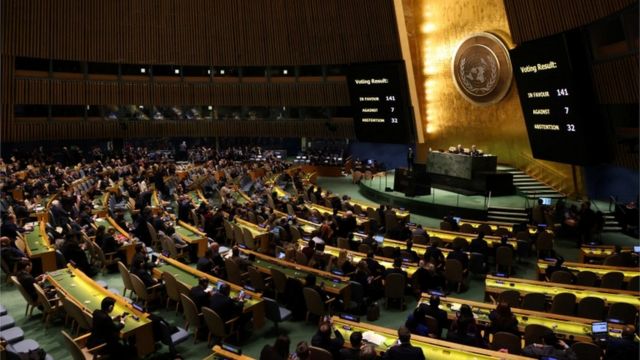- George Wright
- BBC News
141 countries supported the resolution, 32 abstained, and seven countries, including Russia, voted against.
The United Nations General Assembly in New York overwhelmingly supported a resolution condemning Russia’s nearly year-long occupation of Ukraine.
The association called for the withdrawal of troops from Ukraine and an end to the fighting.
141 countries supported the resolution, 32 abstained from the vote, and seven countries, including Russia, opposed it.
This coincided with the withdrawal of a large number of delegates during a speech by Russia’s representative during a session of the Organization for Security and Cooperation in Europe in the Austrian capital Vienna.
The delegation’s withdrawal and vote at the United Nations came a day before the first anniversary of the invasion.
A United Nations referendum called for an early peace.
The resolution reaffirmed support for Ukraine’s sovereignty and territorial integrity, rejecting Russia’s demands to annex territories in the country it occupies.
Last September, representatives in Moscow voted to illegally annex four regions of Ukraine.
The United Nations also called for “the immediate, complete and unconditional withdrawal of all its military forces from the territory of Ukraine within its internationally recognized borders by the Russian Federation” and an end to the fighting.
The move is not legally binding, but it has political significance.
Although the resolution was passed by a majority of countries, some notable countries abstained from voting.
32 countries abstained, including China, India, Iran and South Africa.
Russia, Belarus, North Korea, Eritrea, Mali, Nicaragua and Syria voted against.
Demonstrations outside the OSCE meeting in Vienna
Ukrainian Foreign Minister Dmytro Kuleba said “Russia must end its illegal occupation. The referendum shows that Ukraine’s territorial integrity must be restored.”
He tweeted, “One year after Russia launched its massive invasion, global support for Ukraine remains strong.”
Earlier, the decision to grant visas to the Russian delegation to the Organization for Security and Cooperation in Europe in Vienna sparked outrage.
Ukraine and Lithuania boycotted the session entirely because of Austria’s decision to invite officials from Moscow, even though some are under EU sanctions.
The Austrian government says it is obliged to do so under international law because the OSCE headquarters are located there.
Latvian representative Ryharts Koles called the Russian presence “an issue that everyone ignores” and added that it was a “shame” that they were allowed to participate.
A large number of delegates withdrew during the speech of the Russian representative.
The Russian representative, Vladimir Dashabarov, mocked the delegation’s departure, repeating false claims that the Russian invasion of Ukraine was a war against nationalists and Nazis, whom Moscow says are leading the Kiev government.
The Organization for Security and Cooperation in Europe was established in 1975 to improve relations between the two blocs, the West and the East. Its current members include NATO members and Russia’s allies.
Russian President Vladimir Putin sent 200,000 troops into Ukraine on February 24, 2022, the largest European invasion since the end of World War II.
The United Nations estimates that some 7,199 civilians have been killed and thousands injured in the devastating war that ensued, and the true number may be higher.

“Creator. Award-winning problem solver. Music evangelist. Incurable introvert.”

